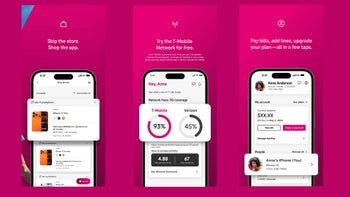Freezing plan prices and a Boost sale puts T-Mobile's merger with Sprint back on track

UPDATE: The rumored merger approval concessions have now taken shape. T-Mobile and Sprint will have to spin off Boost, and complete their 5G network rollout in a time span of three years, during which the new T-Mobile can't raise plan prices from their current levels. "New T-Mobile will make available the same or better rate plans as those offered by T-Mobile or Sprint as of XX date for three years following the merger, " is the exact wording.
1. a Low-band 5G Coverage Area covering at least 97% of the U.S. Population (85% of the rural population;
2. a Mid-band 5G Coverage Area covering at least 75% of the U.S. Population;
3. 5G Sites nationwide;
4. MHz of low-band and mid-band 5G Spectrum averaged over all 5G Sites
deployed nationwide (the sites described in Section I.A.3 above);
5. 75% of the U.S. Population having access to download speeds equal to or greater
than 50 Mbps, as verified by a drive test; 1 and
6. 63% of the U.S. Population having access to download speeds equal to or greater
than 100 Mbps, as verified by a drive test.
1. a Low-band 5G Coverage Area covering at least 99% of the U.S. Population;
2. a Mid-band 5G Coverage Area covering at least 88% of the U.S. Population;
3. 5G Sites nationwide;
4. MHz of low-band and mid-band 5G Spectrum averaged over all 5G Sites
deployed nationwide (the sites described in Section I.B.3 above);
5. 99% of the U.S. Population having access to download speeds equal to or greater
than 50 Mbps, as verified by a drive test; and
6. 90% of the U.S. Population having access to download speeds equal to or greater
than 100 Mbps, as verified by a drive test.
2. a Mid-band 5G Coverage Area covering at least 88% of the U.S. Population;
3. 5G Sites nationwide;
4. MHz of low-band and mid-band 5G Spectrum averaged over all 5G Sites
deployed nationwide (the sites described in Section I.B.3 above);
5. 99% of the U.S. Population having access to download speeds equal to or greater
than 50 Mbps, as verified by a drive test; and
6. 90% of the U.S. Population having access to download speeds equal to or greater
than 100 Mbps, as verified by a drive test.
Boost, Metro by T-Mobile, Virgin Mobile - these are household pay-as-you-go names with millions of subscribers and immediate brand recognition, and they may have to go. Just a few months ago, a T-Mobile exec was arguing that the prepaid businesses will stay unharmed by the merger. In fact, the execs were absolutely certain that they won't have to bargain for anything back in September:
In response to a question, the executives stated that New T-Mobile will retain T-Mobile’s and Sprint’s current prepaid brands as they target different types of customers. Moreover, since New T-Mobile will be incentivized to fill its expansive capacity, it will offer attractive plans to MVNOs.
Boost and MetroPCS may have to be sold
Fast forward to the current regulatory scrutiny, and the plans for revamping the merger proposal apparently include "selling airwave licenses or setting up a new fourth carrier through a network-leasing arrangement," too, both of which sound much less palatable than simply selling Boost or Metro.
The DoJ’s antitrust department that has to sign off, and the Federal Communications Commission, will have to be placated somehow if T-Mobile and Sprint want the merger to still have any chance of passing through, and apparently prepaid is the way. The issue, however, is that the two carriers together hold more than 40% of the pay-as-you-go market, followed by the carrier-agnostic TracFone with 32%, and Cricket with 25%.
The eventual spinoff of Boost, Virgin and Metro by T-Mobile will create a seismic shift in the up-and-coming prepaid market, especially if they keep using the combined network capacity of the new T-Mobile which will also create its own post-merger conflict of interest. Oh, the drama!
Follow us on Google News












Things that are NOT allowed:
To help keep our community safe and free from spam, we apply temporary limits to newly created accounts: